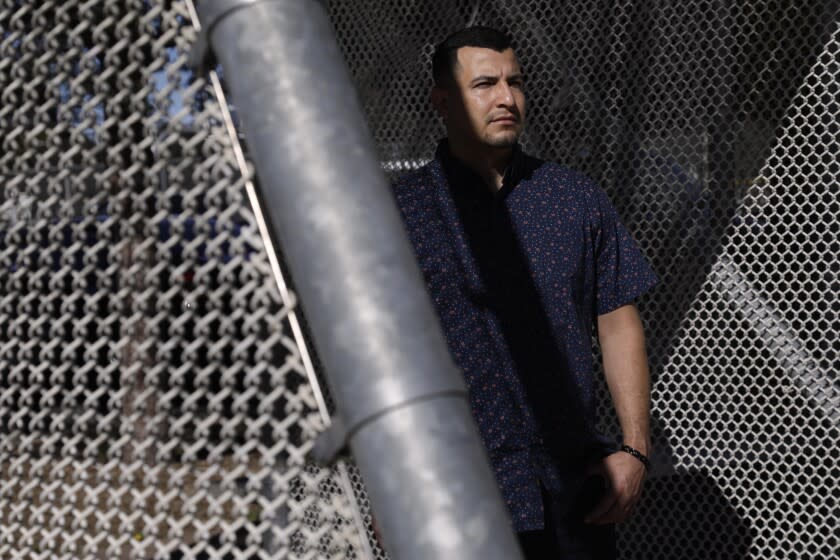Op-Ed: California's 'three strikes' law still carries a devastating human and financial cost. End it now

The stories of those who have served three-strikes sentences in California are heartbreaking and should trouble us all. Leandro Andrade was sentenced to 50 years to life for stealing $153 worth of videotapes. Curtis Wilkerson was sentenced to 25 years to life for stealing a pair of socks. Allan McIntosh similarly received a 25-to-life sentence when he was found with a weapon after being stopped by police for riding his bike with a broken light and not using the crosswalk. Vincent Rico went to prison for life for stealing two pairs of kid’s shoes.
While reforms to the law requiring that a third strike be a serious or violent crime allowed these men to be resentenced and released, there are more than 33,000 people in California’s prisons today whose sentences were lengthened by three-strikes enhancements — including more than 7,400 people whose most recent conviction was neither serious nor violent. Despite efforts to make the "three strikes" law more just, it still results in extreme punishments that put our country’s rate and length of incarceration at odds with most other parts of the world.
Now the California Supreme Court has the opportunity to build more sanity into the state’s failed three-strikes law by ensuring that local elected prosecutors can use their discretion to decline unnecessary and damaging three strikes sentencing enhancements. The issue before the court is whether a state appeals decision was correct in concluding that prosecutors in California must charge enhancements under the three-strikes law, no matter how draconian or irrational the punishment would be.
This contradicts longstanding legal principles and practice. District attorneys have always had discretion in deciding whether and how to charge cases, including enhancements under the three strikes law.
Consider Andrade’s case. He was caught twice stealing videotapes from Kmart stores. The district attorney could have charged him with one or two counts of misdemeanor petty theft, each with a maximum six-month sentence. Or because of his prior felony convictions, he could have been charged with one or two counts of the felony “petty theft with a prior” and given a maximum sentence of three years and eight months. Instead, the D.A. in that jurisdiction chose to charge him with two counts and seek enhancements under the three-strikes law, resulting in a sentence of 25 years to life in prison on each count. Many other D.A.s would have chosen much lesser charges.
Yet, inexplicably, a California Court of Appeals recently ruled in a separate case that district attorneys are required to pursue all three-strikes enhancements, stripping them of their prosecutorial discretion and undermining their ability to pursue rational prosecutions and sentences. This is a misreading of the statute and an unconstitutional restriction on prosecutorial discretion.
It’s easy to believe that locking people up for longer periods of time makes us safer. But there is no evidence that extreme sentences improve public safety.
In Kern County, for example, over 40% of the prison population had their sentences doubled by a prior strike or were sentenced as a third-striker — one of the highest rates in the state. Yet despite imposing the harshest punishments, the county has had the highest homicide rate in the state since 2016. In fact, the research has shown that lengthier prison sentences actually increase recidivism rates and make it harder for formerly incarcerated people to successfully reenter society.
Like nearly every aspect of the criminal legal system, the effects of three-strikes laws are felt disproportionately by communities of color. In California, 80% of people sentenced under the three-strikes law are people of color and the disparities are even greater for those under 26 at the time of the third strike, a deeply concerning reality since California is the only state that gives strikes to 16- and 17-year-olds.
Although the immense human cost resulting from three-strikes enhancements can never be fully measured, the financial cost of this failed policy is astronomical. Taxpayers spend more than $100,000 a year to incarcerate an individual in California and even more as adults grow older and have greater healthcare needs. That’s a cost of at least $3.3 billion per year for those serving sentences extended by three-strikes enhancements.
Some 50% of the people sent to California prisons from Los Angeles County were rated low-risk for reoffending by prison officials, and 95% of individuals who have spent 20 years or more incarcerated are rated low-risk to reoffend. We can maintain public safety without imposing disproportionately punitive sentences.
The best solution would be to repeal the three-strikes law and embrace a far more sensible and humane sentencing system. But until this is done, the California Supreme Court can take a crucial step by making it clear that county prosecutors have discretion to decide if and when these enhancements are a good use of limited resources and align with their obligation to pursue justice. Any other ruling would be an unconstitutional infringement on prosecutorial autonomy.
Keeping more people in prison for longer periods has not made us safer. Instead, these failed strategies have devastated communities of color while stripping us of the resources necessary to invest in strategies proven to prevent and reduce crime.
Erwin Chemerinsky is dean of the UC Berkeley School of Law and represented Leandro Andrade in the U.S. Supreme Court. Gil Garcetti is a former Los Angeles County district attorney. Miriam Aroni Krinsky is the executive director of Fair and Just Prosecution and a former federal prosecutor.
This story originally appeared in Los Angeles Times.
